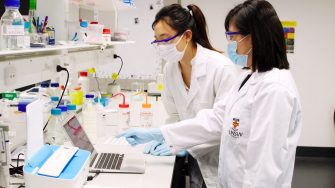Best Before?
The pioneering polymer sensors making sense of food expiration to reduce waste
The pioneering polymer sensors making sense of food expiration to reduce waste

By developing polymer sensors that detect food spoilage in real time, Associate Professor Rona Chandrawati and her team at UNSW are changing the way we consume and dispose of everyday foods.
Australia’s leading researcher in colourimetric polymer sensor technology, A/Prof. Chandrawati has spent the last seven years developing nano sensors to combat food wastage, decrease foodborne illnesses, and ensure everyone has access to safe food.
Many rely on the best before date to decide whether a food is safe to consume, however the best before date is simply an estimate that often leads to foods that are safe to eat mistakenly being thrown away.
To address this issue A/Prof. Chandrawati and her team developed precise nano sensors that react to compounds generated by food that has gone bad. These sensors are attached to food packaging in the form of a sticker. Once spoilage occurs, the sensor reacts with the gasses produced and the sticker changes colour from blue to red.
This technology enables consumers to monitor food quality at home without the need for specialised equipment. “The idea is, if it turns red, it’s obvious your food has spoiled,” explains A/Prof. Chandrawati. “Once that happens, the colour won’t change back so there’s no false negative.”
“The sensors aren’t meant to replace the best before date, but to compliment it. To helps us make better decisions about whether we throw out food or consume it.”
To continue developing the technology, A/Prof. Chandrawati works with a team of postdoctoral researchers, PhD students, and undergraduate students with multidisciplinary expertise across chemical engineering, materials chemistry, and food science. “Everyone is working on different aspects of the project,” she says, “from identifying the gas to working out how we might be able to connect the sensors with traceability and blockchain in the future.”
This would allow the technology to be used to help trace instances of wide-spread food contamination. “We hear a lot about food being recalled because of contamination,” A/Prof. Chandrawati explains. “By tracking the journey of a food product, we could extract information about where a contamination outbreak has come from, where it’s travelled through, and help supermarkets understand which batches of product should be disposed of and which are OK.”
Through the use of A/Prof. Chandrawati’s sensor technology, consumers, retailers and industries will be able to better control food management and production. She says, “It’s really about making the most of the food we already have and wasting less, so we’re not further contributing to climate change through the methane gas emissions from landfilled food waste.”
As Australia’s best engineering faculty turns 75, there are just as many reasons why we’ve earned that title. Discover new stories weekly, celebrating the successes that have enabled progress for all.